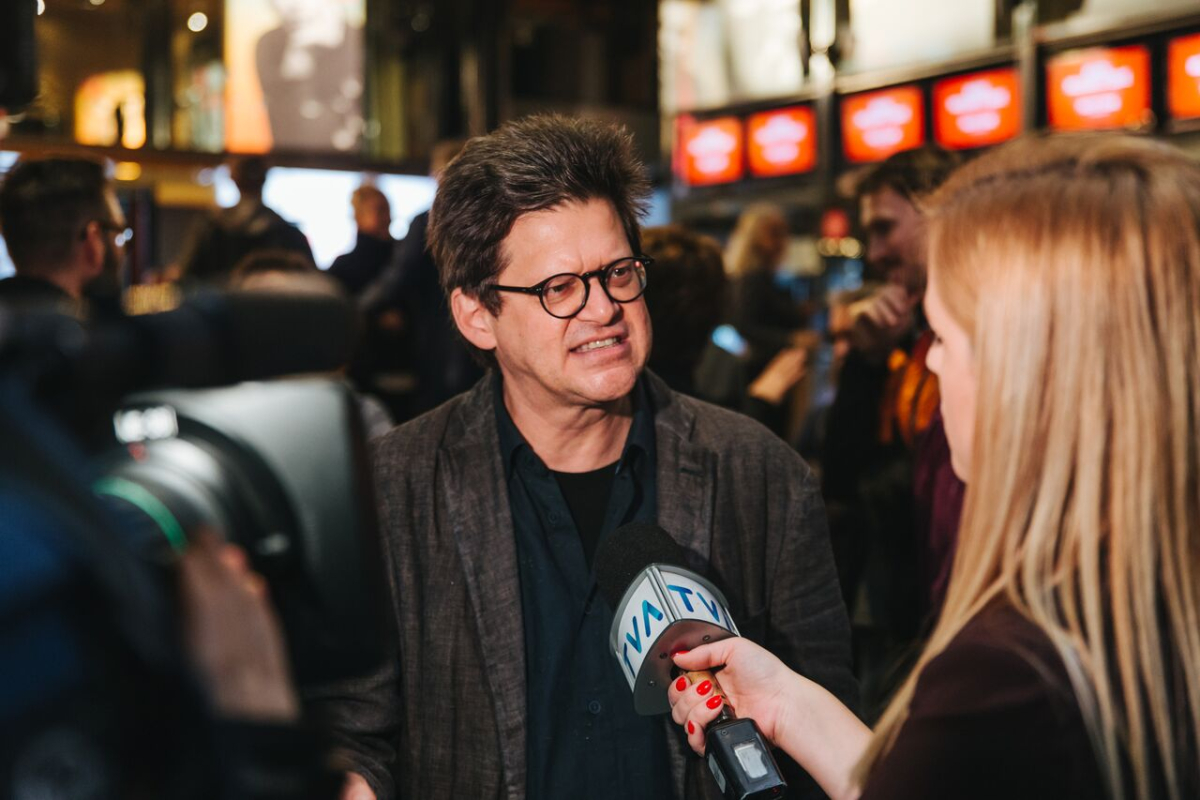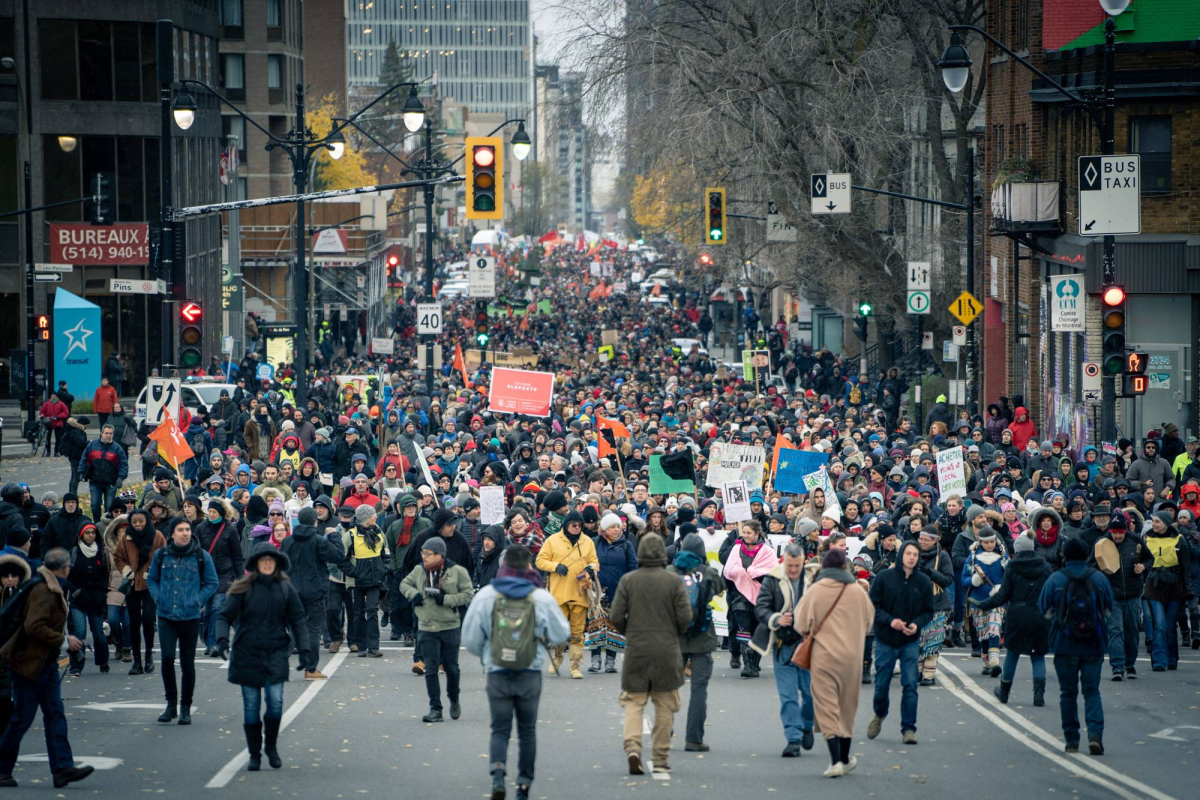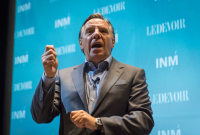Support strong Canadian climate journalism for 2025
Many thousands of Quebecers have mobilized to demand decisive measures to fight climate change as Premier François Legault’s new government and opposition legislators prepare to convene for the first time since the Oct. 1 election.
About 214,000 signatures were registered in two weeks on an online pledge to reduce personal carbon footprints and to demand proactive political leadership on climate change. And hot off the heels of the largest environmental march in Montreal in six years, a gathering is planned outside the National Assembly in Quebec City next Wednesday, the day that Legault will give his inaugural address.
The Pact for Transition asks the Quebec government to stop all new fossil fuel exploitation in the province, abolish fossil fuel subsidies, ensure that Quebec reaches its climate target of 20 per cent less greenhouse gas emissions in 2020 compared to 1990 levels, and goes beyond its target of 37.5 per cent for 2030.
The group behind a 50,000-strong Montreal demonstration earlier this month, The Planet Goes to Parliament, has a similar suite of demands and asks the government to commit to reducing greenhouse gas emissions by 45 per cent by 2030 before fully stopping them by 2050.
“The idea is to make François Legault feel that the whole population is listening and waiting for a response to our demands,” explained Isabelle Dupras, a spokesperson from The Planet Goes to Parliament. The volunteer citizens group is providing transportation to the provincial capital from Montreal and Brome-Missisquoi, a municipality in southern Quebec that borders Vermont, on Nov. 28.
Theatre director Dominic Champagne, the instigator behind The Pact for Transition, described the two movements as “cousins” in an interview with National Observer on Monday. His hope is that the petition forces Legault to “undertake a scientific, popular, business consultation on how Quebec can fight climate change and how can we change our economy, our way of production and consumption.”
“We are hoping the weight of the numbers and public opinion will make a difference on the laws and the decisions made by our government at every level,” he said. “The Pact is answering to a huge need coming from the population. …It’s really about trying to understand and put into practice what scientific reason is calling on us to do. We are the contemporaries of a major collapse of life all over the planet.”
A Québécois tradition
Greenpeace Quebec spokesperson Patrick Bonin told National Observer on Wednesday that the recent mobilizations in Quebec is the result of various factors. Among them are the release of the United Nations Intergovernmental Panel on Climate Change (IPCC) special report on Oct. 8; a deadly heatwave that killed 89 Quebecers in the summer; Prime Minister Justin Trudeau’s decision to purchase the Trans Mountain pipeline; and the polarizing environmental stances of parties in Quebec election campaign.
The left-leaning Québec solidaire party ran on a series of bold environmental proposals, including a ban on the sale of gasoline-powered cars by 2030. The party tripled its caucus to 10 seats on election night. Meanwhile the governing Coalition Avenir Québec plans to extend four major highways in Quebec and repeatedly said on the campaign that the best thing Quebec can do to fight climate change is to sell hydroelectric power to fossil-fuel dependent jurisdictions outside of Quebec, such as the United States. and Ontario.
The party also said it would be open to evaluating oil resources on the shale-rich island of Anticosti in the Gulf of St. Lawrence and would not rule out fracking in areas of northern Quebec where there was “social acceptability." Legault has since retracted his comments about Anticosti and told reporters on 14 Nov. that Quebec “was not open to fracking in shale gas.”
Bonin added that recent mobilization efforts in Quebec are a “continuum” of a proud Quebec history of climate demonstrations, dating from protests over the construction of the Suroît power plant near Montreal in 2004.
He mused that this is partly due to the province’s unique culture, French language and insular media cycle, which encourages Quebecers to focus inwards on local environmental issues and priorities. “In French, we say on est tissé serré, we are tight knit,” he said.

Aiming for one million
The Pact was launched by a collective of 400 Quebecer celebrities and artists, including director Denis Villeneuve, author and comedian Yvon Deschamps and Cirque de Soleil founder Guy Laliberté.
They aim for one million signatories, or the equivalent of 12 per cent of Quebec’s population, according to Champagne.
In a “warm and open” meeting with Legault on Nov. 9 to discuss the Pact, Champagne said the premier acknowledged that he had “got the message” that climate action mattered for Quebecers, in part because of the traction gained by Québec solidaire in the recent election.
Champagne said Legault still has a long way to come. “Unfortunately he is very old school in the way he approaches economy and environment. He still thinks that ecology is disturbing the creation of jobs. While in Germany or Denmark it’s the opposite. There are interesting jobs for the future involving their economy in the sense of the transition.”
Not just the cleaner, greener usual suspects
Over the past week, Champagne’s Pact has endured criticism for some of its famous signatories’ extravagant, energy-intensive lifestyles. Cirque de Soleil’s Laliberté flies in a private jet and actor Guillaume Lemay-Thivierge has appeared in advertisements as a celebrity ambassador for car manufacturer Hyundai.
Champagne retorted that “climate has to involve everyone,” explaining that he wanted the Pact to be as “open and popular as possible and open to everyone, not only the cleaner, greener usual suspects.”
Champagne said that some of the Pact’s signatories may be signing up from outside of Quebec, despite its provincial agenda. Signatories need to provide a postal code, but it does not have to be in Quebec.
2020 target unattainable
Marie-Julie Couturier, press attaché for Environment Minister MarieChantal Chassé, told National Observer in an email on Wednesday that the government is “committed to listening to the concerns of the population when it comes to deciding on the measures it will take. The proposals put forward in the Pact for Transition will be examined within the framework of measures that the government intends to unveil soon.”
However, she said that one of the Pact’s aims – to reach Quebec's current greenhouse gas emissions target for 2020 – would not be feasible. In order to “move closer to the target,” the government will buy greenhouse gas emission allowances from abroad.
Couturier pointed out that Quebec’s greenhouse gas emissions dropped by 8.8 per cent between 1990 and 2015, a period when the population rose by 18 per cent and GDP increased by 60 per cent.
Quebec’s fight against climate change, she wrote, would be linked to the "province’s economic development, by strengthening the competitiveness of our companies, using natural and energy resources more responsibly and efficiently in the long run.”
If you’ve made it this far, you must care about in-depth and responsible journalism. How about supporting more articles like this one? Get 60% off during our Black Friday sale for access to Canada’s top investigations on energy, climate, the environment and more. If you’re already a subscriber, please consider gifting a subscription, just in time for the holiday season.
Editor’s Note: This piece was updated at 11:22 am E.T. on Nov. 26, 2018 to correct one of the Pact’s aims. The Pact for Transition asks the Quebec government to go beyond its climate target of 37.5 per cent less greenhouse gas emissions in 2030 compared to 1990 levels, not reduce emissions by 50 per cent by 2040.





Comments
Germany's GHG emissions went down significantly between 1990 and 2015 (-27.7%), but since the economic crisis in 2009 (908 Mt CO2 e), the level of emissions has only gone down by 1 Mt in 2015. Germany's GHG emissions went down by only 9% between 2005 and 2015 (Germany still uses coal to produce around 40% of its electricity).
In Canada, GHG emissions went down in four provinces between 1990 and 2015. Nova Scotia and New Brunswick managed to reduce their emissions by 18.2% and 13.5% during that period, while Quebec and Ontario went down 10% and 8.3% respectively. Emissions in the rest of Canada went up, with the exception of the territories.
Between 2005 and 2015, Nova Scotia and New Brunswick cut their emissions by 30.2% and 30.6% respectively. Quebec went from 88.9 Mt to 80.1 Mt (-9.9%). Ontario cut its emissions from 204.4 Mt to 166.2 Mt during the same period, a reduction of 18.7%. In BC, emissions went down 4.7%.
Alberta has significantly increase its GHG emissions, going from 175.3 Mt in 1990 to more than 274.1 Mt in 2015 (+56.4%). Saskatchewan did even worst, going from 45.2 Mt to 75 Mt (+65.9%) during the same period.
Quebec and Ontario still have a long way to go to meet their emissions reductions targets. With new governments in Ontario and Quebec which don't seem particularly interested (especially the Doug Ford administration) to reduce significantly their emissions, there's little chance that these targets will be reached.